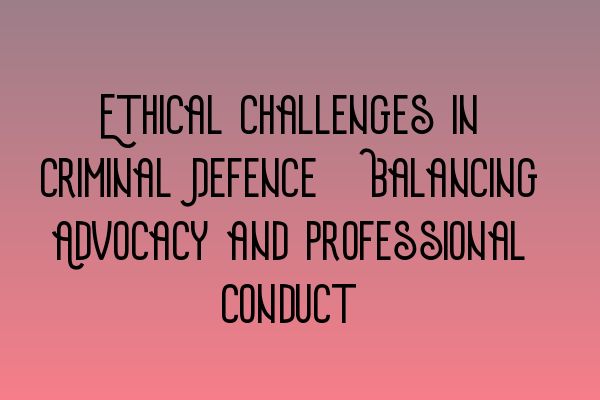Ethical Challenges in Criminal Defence: Balancing Advocacy and Professional Conduct
Welcome to the SQE Criminal Law & Practice Law UK blog. In this article, we will explore the ethical challenges faced by criminal defense solicitors and the importance of striking a balance between advocacy and professional conduct.
Understanding Ethical Challenges
As criminal defense solicitors, we are entrusted with the important task of representing individuals accused of crimes. Our primary duty is to advocate for our clients and ensure they receive a fair trial. However, this role often comes with ethical challenges that require careful consideration and navigation.
One of the key ethical challenges faced by criminal defense solicitors is the balancing act between advocating for our clients’ interests and upholding professional conduct. While zealous advocacy is vital to protect the rights of our clients, it is important to do so ethically and within the boundaries of the law.
The Importance of Professional Conduct
Professional conduct is the cornerstone of the legal profession. Criminal defense solicitors have a duty to conduct themselves in a manner that upholds the integrity of the profession and maintains public trust. This means adhering to ethical guidelines, maintaining confidentiality, avoiding conflicts of interest, and treating all parties involved in the legal process with respect.
By demonstrating a commitment to professional conduct, we not only fulfill our ethical obligations but also contribute to the effective functioning of the criminal justice system. Clients rely on us to navigate the complexities of the legal system, and our conduct plays a crucial role in building trust and confidence in our profession.
Striking the Balance: Advocacy vs Professional Conduct
The challenge lies in striking the right balance between advocating vigorously for our clients and maintaining professional conduct. While it is our duty to represent our clients’ interests, we must do so within the confines of the law and ethical guidelines.
This balancing act often comes into play when we are faced with conflicting ethical considerations. For example, we might uncover information that could assist our client’s case but was obtained unlawfully. In such instances, we must carefully weigh our duty to advocate for our clients with the obligation to uphold the rule of law. It is crucial to consider the potential impact on the integrity of the legal system and the public’s trust in the profession.
It is also important to remember that our duty as criminal defense solicitors extends beyond the courtroom. We have an ethical responsibility to engage in continuous professional development, staying abreast of changes in the law, and maintaining the necessary skills and knowledge to provide effective representation to our clients.
Conclusion
Balancing advocacy and professional conduct is a fundamental challenge for criminal defense solicitors. By navigating these ethical challenges with integrity, we can fulfill our duty to represent our clients zealously while upholding the standards of our profession.
If you would like to learn more about the Solicitors Qualifying Examination (SQE) or other legal topics, check out our related articles:
